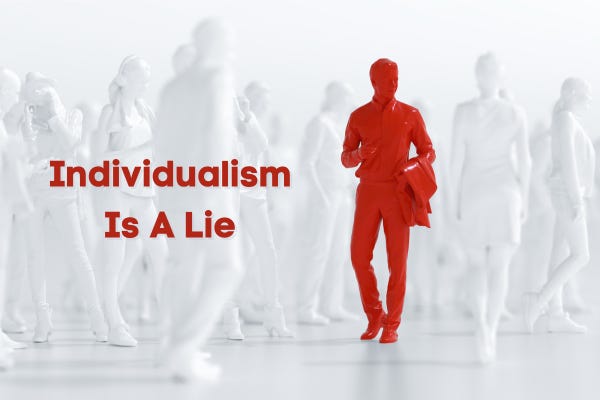Individualism Is a Lie
Why cultural engagement matters
Bafflingly, millions of people ate beans with toast for breakfast this morning.
While that was technically an option available to me, it did not even cross my mind as I strolled from my bedroom to the kitchen to begin the day. If it had crossed my mind, the very thought may have nauseated me. What a disgusting breakfast.
Despite having the same option, you probably didn’t entertain the idea, either. And yet, again, millions of people ate it without thinking twice.
Maybe we aren’t the individualists we believe ourselves to be.
Maybe thousands of times per day we’re heavily impacted by factors entirely out of our control, and maybe we’re—to some significant percentage—a product of the choices created for us.
We saw this in more impactful terms across 2020-21. While Covid responses largely fell along red-blue lines, there were plenty of liberals in Florida who were more lax on masking and distancing than some conservatives on the West coast.
In a sense, the culture around us grants us permission for how to act and speak.
It does not force our choices, but it does go a long way toward providing the menu of options.
There are millions of similar lines of evidence we can point to across the span of our lives that show that, while we may be making choices moment to moment, the choices themselves and the options available were largely pre-selected for us.
Culture that existed before we were born and is continually being restructured under our feet has enormous influence on who we are.
Even those who fancy themselves counter-cultural have their rebellion largely charted for them. For example, America’s “new atheists” of recent years mostly raged against Christianity rather than Hinduism or Judaism. Culture dictated that Christianity was their competition, and culture dictated that they were free to rage against it. Plenty of jokes about God as the Flying Spaghetti Monster. Not so many cartoons of Mohammed.
In other words, culture conditions people toward what they believe and value.
I am certain there are people born a century ago who will spend eternity in heaven, who, if born today, may have been culturally conditioned into transgenderism, atheism, and hating God.
This is not to deny their free will. It is to acknowledge the set of choices they’ve been given and the cultural pressures to which they’ve been subjected.
And, it’s to acknowledge what I’ve been saying since day one of this site:
People are sheep, and
The leaders creating culture bear an Atlas-sized load of responsibility for the culture they build around people
This is why Christian cultural and political engagement is so important.
We cram everything the church does into the basket of evangelism, but evangelism is exponentially harder when culture predisposes people toward skepticism.
I believe this explains the confusing but technically correct Greek reading of the Great Commission, which says to “disciple the nations.” Sure, nations can’t be baptized, but they can be taught to observe Jesus’ commandments. And that’s largely what happened in the West, and what needs to happen again.
To lay out the road map, evangelism brings baptisms, baptisms bring changed people, changed people create a culture, and a culture creates greater evangelism.
Every person we convert represents countless more potential Christians, if we bring them into our culture. An American Christian culture led my grandmother to walk into a church building with a friend one Sunday. She got baptized, she got her parents baptized, her eventual husband was baptized, her daughter was baptized, and I got baptized. You’re reading this right now because cultural influence laid the groundwork for evangelism, which created a culture in our family. You likely have a similar story. Or, if you’re a recent convert, you may be the start of one.
Do you get how powerful that is?
So, all of us talking about this have been baptized. It’s time we live out the changes and rededicate ourselves to culture-building. Consider it a form of pre-evangelism, planting the seed in people’s subconscious minds before we ever get a chance to preach the Gospel. It’s like conditioning people to accept beans and toast before they’re even born.
If we refuse to engage the culture beyond evangelism for fear of being called bigoted and “damaging our witness,” we don’t believe in the Lordship of Christ over all things. And we don’t believe in His parable of the leaven, either.
As a result, with every generation we’re back to the drawing board, trying to pick off a few individuals here and there because we have not demonstrated how Christ’s rule blesses a people.
Instead, we must begin to think of our efforts as both individual and corporate ministering, winning people to create a people. Because culture matters. And without one, we can’t compete with one.



Excellent entry, Jack. Jesus is not a culture. However, when we receive Jesus as our indwelling Savior, culture is strongly impacted.
"If we refuse to engage the culture beyond evangelism for fear of being called bigoted and “damaging our witness,” we don’t believe in the Lordship of Christ over all things."
GREAT statement. So true. We tend to shy away from speaking up because we've been pigeon-holed by our culture into believing if we do so we're haters or we're the extremists. We need to lovingly, logically STAND. "For this reason take up the full armor of God, so that you may be able to resist in the evil day, and having prepared everything, to take your stand" (Eph 6:13).